A teen couldn't get size 23 shoes until Shaq stepped in. Other families feel his struggle.
Back in February, Jor’el Bolden described his struggle to find shoes that fit his size 23 feet as "torture."
Featured in multiple news segments to talk about how he stuffs his feet into size 22 sneakers, the teen was eventually contacted by NBA superstar Shaq, who gifted him with clothes and 20 pairs of shoes.
While he can now rejoice and has tons of comfortable kicks to choose from, other families feel his pain and wonder when they'll get some relief.
Take Sandy Gionet, for instance. She has three sons, two of whom live with her and wear larger shoe sizes that are hard to find.
Her 12-year-old, Michael, is 6-foot-4 and wears a men’s 15 extra wide shoe. Her 15-year-old, Mathieu, is 6-foot-3 and wears a men's size 16 that he is quickly outgrowing.
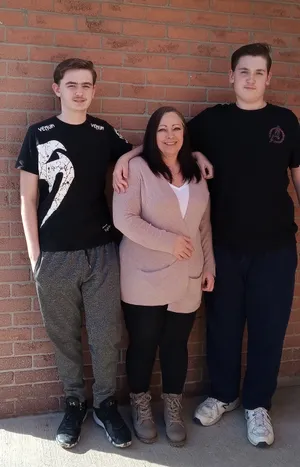
“He loves basketball, and has big dreams of playing in the NBA,” she said about 15-year-old Mathieu.
She also struggles to find socks for her sons and recently ordered some labeled 12 to 16 on Amazon. She worries about what will happen when they can no longer wear them.
This teen wears a size 23 shoe.It's stopping him from living a normal life.
One mother’s struggle to find shoes that fit
Gionet, who lives in Ontario, Canada, is on disability and works as a lunchroom supervisor at her son's school for an hour a day. She is on a fixed income and said finding larger shoes requires money she and some other parents don’t have. She has often wondered why larger companies such as Walmart won’t sell larger shoes.
Both of Gionet’s sons have one pair of shoes. Mathieu, 15, has a pair of Nikes while Michael has a pair of New Balances.
“They wear them until they're worn down,” she told USA TODAY on March 4. “My 12-year-old has been outgrowing shoes pretty quickly. His last pair of shoes, I spent $120 on. Being on a fixed income and then having to spend that kind of money on two boys has been such a struggle for me.”
Her 15-year-old wants to play basketball and would love to make it to the NBA but the money she wants to use to enroll him in a basketball league instead has to go to food, clothes and shoes.
She said she knows getting custom shoes can be pricey and she just doesn’t have the financial backing to make it work. She wishes more stores would sell larger shoe sizes because she sees now that there are more people with bigger feet who need comfortable shoes to live their daily lives.
“My son is growing like a weed and he's only 12,” she said. “His feet are going to get larger and I'm getting really nervous about ‘How am I going to be able to get him shoes?’ It would be great if these companies would sell larger shoe sizes. It would just be such a relief.”
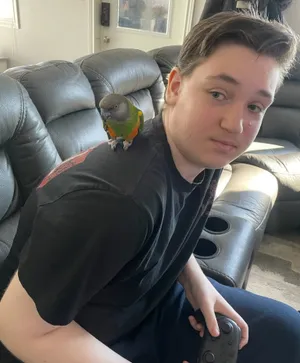
Small businesses hone in on market for big shoes
Brandon Eley is president and co-founder of 2BigFeet, a shoe store based in LaGrange, Georgia that opened in late 1998. His co-founder recalled having large feet as he grew up in south Georgia. His family drove hours to search stores for shoes large enough for his feet.
Eley and his co-founder eventually opened their own shoe retailer. They now carry about 40 different brands and the largest size they have in stock is a 21, he told USA TODAY on March 5.
His company buys whatever shoes they can find in larger sizes.
“The problem is over the years … as companies look at their business model and their offerings to their customers, they often decide to cut styles that are made in big sizes,” he said.
Still, some brands have committed to manufacturing bigger sizes, such as Dunham. However, these companies are sometimes bought out by companies that reduce the sizes they produce, Eley said.
When brothers Seth and Zac Longaker, based in Portland, Oregon, started their shoe business, Oddball Shoe Company, in 1997, they carried 10 or 20 styles in larger sizes.
Now, they’ve got at least 180 styles.
“We were the first people to do something like this ever in this little niche industry,” Seth told USA TODAY on March 11. “Zac and I both grew up, we wore size 16 shoes. We used to go everywhere looking for stuff and could never find anything a teenager would remotely want.”
Seth described himself and Zac as two tall guys who wanted to fit in. They wanted to make it easier for people like them to find stylish shoes and now, they sell socks, as well as shoe sizes 14 to 20.
“Above a size 20 is a rough world to be in,” Seth said. “It's just there's not a lot made. The vendors, the companies don't see value in making shoes above that size.”
Neither Walmart, Zappos, Nike or New Balance replied to USA TODAY’s requests for comment but a spokesperson for Adidas said the company sells shoes on its website up to a size 18 in men’s and women’s. Zappos also sells shoes in larger sizes.
Some companies see no value in making larger shoes
Part of the reason for this lack of larger sizes among big companies is whether or not the shoes will sell. If stores stock their shelves with sizes 8 to 12, they’ll sell much faster than larger sizes, said Seth.
He recalls previously going to stores like Nike, Nordstrom, Walmart, Target or Dillard's and finding maybe one size 15 shoe.
“There were probably 100 guys looking for that same size,” he said. “After all these years, there has really been no adjustment within a retail footprint location where people are actually stocking out shoes on their shelf.”
The lack of options from big business leaves room for Oddball and other companies to be there for consumers, but it doesn’t solve the issue for people looking for big shoes in a time crunch, or people who don’t want to have to ship shoes back and forth to find the right fit.
Not to mention companies like Walmart and Target have their own products and brands, Seth said. If they were to produce larger shoes, they’d have to create a wide array of sizes, which isn’t easy.
“If I wanted to go out and start my own line of shoes and all I want to do is size 15 to 18 or 20, you're talking a $50,000 to $100,000 investment,” he said, adding that it includes designs, manufacturing and materials.
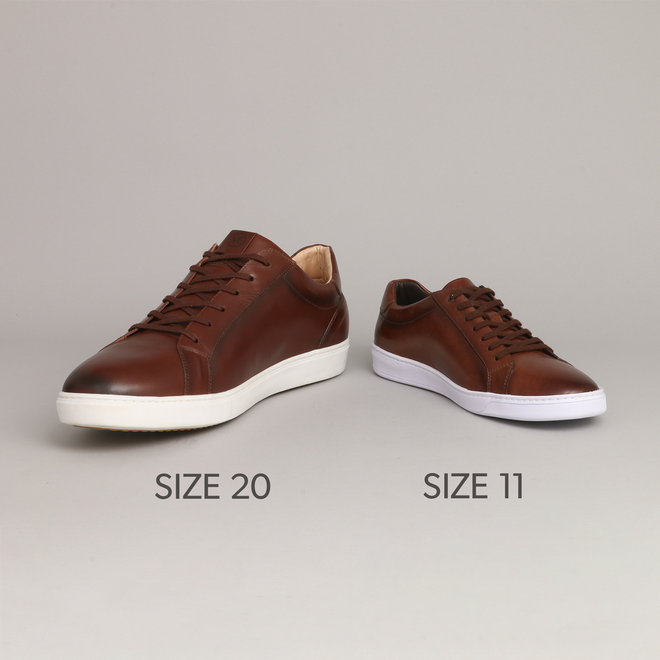
More on what it takes to make big shoes
Eley, who owns 2BigFeet, said his company carries multiple brands and even makes its own shoes under the brand name Michael Ellis Footwear, which goes up to a size 26.
Making shoes requires molds, so bigger molds are needed to accommodate larger sizes. His company works with factories in Brazil that are able to make larger production molds, he said.
He’s familiar with stories in the media about teens who need bigger shoes and are gifted them by larger companies. While he thinks it’s great that companies are stepping up to help, for every teenager whose name makes it into the newspaper, there are more in need.
Eley acknowledged that it is expensive to make larger shoes. For example, the molds for shoe outsoles can cost anywhere between $1,000 and $3,000 depending on where they’re being made.
“The ones that we’re making, your standard sneaker outsole, are about $1,000 per mold,” he said, adding that the company needs molds for every size and width that they produce.
For smaller companies like 2BigFeet, it’s “a huge gamble” but they’re giving it a try anyway, he said. In the grand scheme of things, larger companies have the resources to make it work.
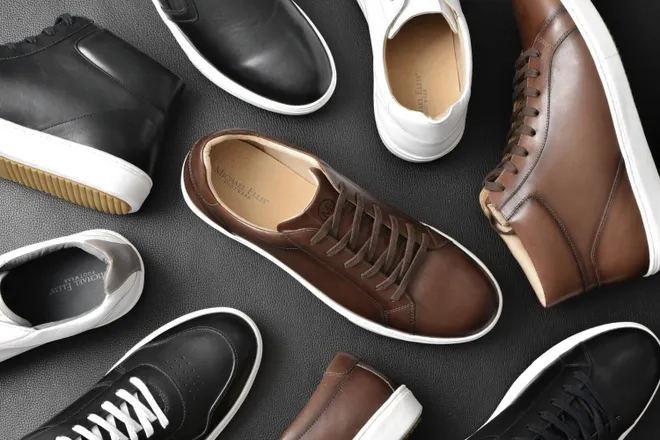
'I curled my toes up in my 13s'
Mo Morris runs Big Shoes, based in Austin, Texas and grew up in rural Indiana. He recalls stuffing his feet into shoes three sizes too small.
“When you're growing up, you don't know there's something bigger than the size 13,” he told USA TODAY on March 7. “At least I didn't at the time I grew up. I curled my toes up in my 13s because I just didn't think there was a bigger shoe and then I finally got measured and they told me how big my foot was.”
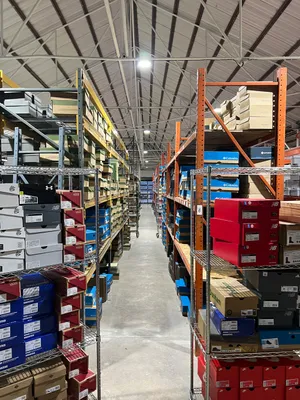
He first started searching for shoes online in 1997 after struggling to find shoes of his own. Through word-of-mouth, he found shoes at a Japanese toy store.
“In the back, they sold Doc Martens and stuff,” he said, adding that they had about three pairs of size 16 shoes, so he snatched them up.
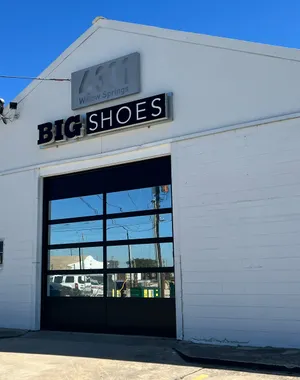
He eventually started his own business that sells big shoes, calling Big Shoes “nothing more than a reseller" that doesn't make its own shoes.
“We’ve considered it but we buy directly from all the manufacturers," he said.
Morris, who has a storefront in Austin, makes most of his sales online and said 16 is their most popular size.
Most people tell him before they come across his store, they’d go to other stores and ask “What do you have in a size 16?”
Because of stores like his and others, they have more options.
It’s not just shoes people struggle to find. Big socks are scarce too.
Socks are also hard to find when your feet are larger, said Seth Longaker, who owns Oddball Shoe Company with his brother Zac. Seth even said his company’s socks have helped his business thrive over the past few years.
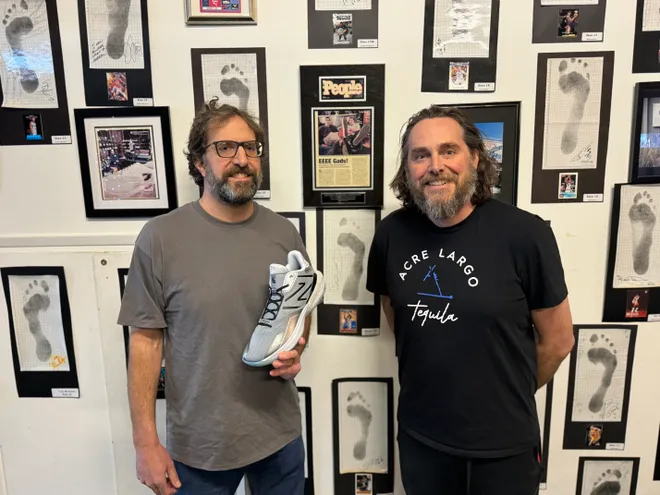
“We have tons of parents who are like ‘My kids have been blowing out of their socks like crazy,'" he said. "They get holes in them, they stretch, they don't fit. They last a week and now we're trying to solve that problem.”
Companies like Walmart, Nike, Adidas and others have the capability to make bigger shoes and socks, he said. The problem is they’re profit-driven. They just don't see the value in it.
“The problem is that to do it once, they're going to have to do it twice,” he said, adding that the cycle will continue and costs will rise. “I think once people start coming out from the woodworks, then they're going to realize that there's a lot of kids out there who have these issues."
Saleen Martin is a reporter on USA TODAY's NOW team. She is from Norfolk, Virginia – the 757. Follow her on Twitter at@SaleenMartin or email her atsdmartin@usatoday.com.
Disclaimer: The copyright of this article belongs to the original author. Reposting this article is solely for the purpose of information dissemination and does not constitute any investment advice. If there is any infringement, please contact us immediately. We will make corrections or deletions as necessary. Thank you.


